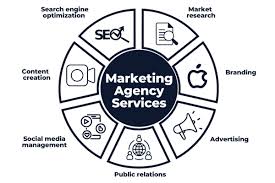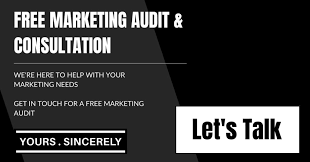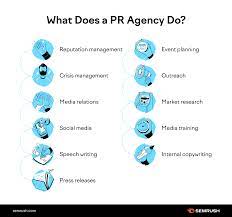Unlocking Success: The Strategic Role of Public Relations Agencies in Today’s Business Landscape
The Role of Public Relations Agencies in Today’s Business World
Public relations agencies play a crucial role in helping businesses effectively communicate with their target audiences, manage their reputation, and build strong relationships with key stakeholders. In today’s fast-paced and competitive business environment, the services provided by PR agencies have become more important than ever.
One of the primary functions of a public relations agency is to help businesses craft and disseminate their key messages to the public. This involves developing strategic communication plans that are tailored to the specific needs and objectives of each client. By leveraging various communication channels, such as media relations, social media, events, and influencer partnerships, PR agencies help businesses reach their target audience and convey their brand message effectively.
Furthermore, public relations agencies play a crucial role in managing crisis communication for businesses. In the event of a crisis or negative publicity, PR agencies work swiftly to develop a response strategy that helps protect the reputation of the business and mitigate any potential damage. By providing timely and transparent communication, PR agencies help businesses navigate challenging situations and maintain trust with their stakeholders.
Another key function of public relations agencies is to build and maintain relationships with the media. PR professionals have extensive networks within the media industry and understand how to pitch stories effectively to secure media coverage for their clients. By generating positive media exposure through press releases, interviews, and feature stories, PR agencies help businesses enhance their visibility and credibility in the market.
In addition to traditional media relations, public relations agencies also play a vital role in managing digital communications for businesses. With the rise of social media and online platforms, PR agencies help businesses navigate the digital landscape by creating engaging content, monitoring online conversations, and responding to customer inquiries in real-time. By leveraging digital tools and analytics, PR agencies help businesses track their online reputation and measure the impact of their communication efforts.
In conclusion, public relations agencies are essential partners for businesses looking to enhance their brand image, engage with their target audience effectively, and navigate complex communication challenges. By providing strategic counsel, creative solutions, and expert guidance, PR agencies help businesses succeed in today’s dynamic business world.
Top 8 Advantages of Engaging Public Relations Agencies
- Expertise in strategic communication planning
- Access to media networks and industry contacts
- Ability to craft compelling brand narratives
- Experience in crisis management and reputation protection
- Specialised knowledge in various industries and sectors
- Track record of generating positive media coverage
- Skills in digital communication and social media management
- Professional guidance on building strong stakeholder relationships
Challenges of Engaging Public Relations Agencies: Costs, Conflicts, and Control Issues
- Costly services that may not be feasible for small businesses with limited budgets.
- Potential conflicts of interest if the PR agency represents competitors in the same industry.
- Difficulty in measuring the exact ROI of PR activities, making it challenging to evaluate their effectiveness.
- Risk of miscommunication or misalignment between the business and the PR agency, leading to ineffective messaging.
- Limited control over the timing and content of media coverage, as it is ultimately up to journalists and editors.
- Dependency on external agencies for critical communication functions, which can pose risks during crises or unforeseen events.
Expertise in strategic communication planning
Public relations agencies offer a valuable pro with their expertise in strategic communication planning. By leveraging their in-depth knowledge and experience in the field, PR agencies can develop tailored communication strategies that align with the specific goals and objectives of their clients. From identifying target audiences to crafting key messages and selecting the most effective communication channels, PR agencies excel in creating comprehensive plans that help businesses effectively convey their brand message and achieve desired outcomes. Their strategic approach ensures that every communication effort is purposeful, impactful, and aligned with the overall business objectives, ultimately contributing to the success and growth of their clients.
Access to media networks and industry contacts
Public relations agencies offer a valuable advantage through their access to extensive media networks and industry contacts. By leveraging these relationships, PR agencies can secure valuable media coverage for their clients, helping businesses increase their visibility and credibility in the market. Through strategic media outreach and targeted pitching, PR agencies can connect businesses with key journalists, influencers, and industry experts, facilitating opportunities for exposure and engagement. This access to media networks and industry contacts enables PR agencies to amplify their clients’ brand message effectively and reach a wider audience through trusted channels.
Ability to craft compelling brand narratives
Public relations agencies excel in their ability to craft compelling brand narratives that resonate with audiences and create meaningful connections. By leveraging storytelling techniques and strategic messaging, PR agencies can transform a brand’s identity into a captivating story that engages and inspires consumers. Through skilful narrative development, public relations professionals can shape perceptions, evoke emotions, and establish a strong brand presence in the minds of the target audience. This expertise in crafting compelling brand narratives allows public relations agencies to effectively communicate a brand’s values, mission, and unique selling points, ultimately driving brand loyalty and differentiation in the competitive marketplace.
Experience in crisis management and reputation protection
Public relations agencies bring valuable expertise in crisis management and reputation protection to businesses, offering a strategic advantage in navigating challenging situations. With their wealth of experience and knowledge, PR agencies are adept at developing proactive strategies to handle crises effectively, mitigate reputational risks, and maintain trust with stakeholders. By providing guidance on communication tactics, managing media relations during crises, and implementing swift response plans, PR agencies play a critical role in safeguarding the reputation of businesses and helping them emerge stronger from adversity.
Specialised knowledge in various industries and sectors
Public relations agencies offer a valuable pro by providing specialised knowledge in various industries and sectors. With expertise spanning across different fields such as technology, healthcare, finance, consumer goods, and more, PR agencies bring in-depth understanding and insights that are crucial for crafting targeted communication strategies. This specialised knowledge enables PR professionals to effectively tailor messaging, identify key trends, and engage with specific audiences within each industry or sector. By leveraging their expertise, public relations agencies can help businesses navigate the complexities of different markets and establish a strong presence that resonates with their target stakeholders.
Track record of generating positive media coverage
Public relations agencies offer a valuable pro with their track record of generating positive media coverage for businesses. By leveraging their expertise in media relations and storytelling, PR agencies have the ability to secure meaningful press coverage that enhances a company’s visibility and credibility. Through strategic pitching, relationship-building with journalists, and crafting compelling narratives, PR agencies can effectively position businesses in the media spotlight, helping them reach a wider audience and shape a positive public image. This pro demonstrates the significant impact that public relations agencies can have on boosting brand awareness and reputation through successful media coverage strategies.
Skills in digital communication and social media management
Public relations agencies bring valuable expertise in digital communication and social media management to help businesses effectively navigate the ever-evolving online landscape. With a deep understanding of digital platforms and trends, PR agencies are adept at crafting engaging content, monitoring online conversations, and leveraging social media channels to connect with target audiences. By harnessing their skills in digital communication, PR agencies help businesses enhance their online presence, build brand awareness, and foster meaningful relationships with customers in the digital age.
Professional guidance on building strong stakeholder relationships
Public relations agencies offer invaluable professional guidance on building strong stakeholder relationships. By leveraging their expertise in strategic communication and relationship management, PR agencies help businesses cultivate meaningful connections with key stakeholders, including customers, investors, employees, and the media. Through tailored communication strategies and engagement initiatives, PR agencies enable businesses to establish trust, credibility, and loyalty among their stakeholders, ultimately enhancing their reputation and fostering long-term relationships built on mutual understanding and transparency. The proactive approach of PR agencies in nurturing stakeholder relationships contributes significantly to a business’s success and sustainability in today’s competitive landscape.
Costly services that may not be feasible for small businesses with limited budgets.
One significant drawback of public relations agencies is the cost associated with their services, which may not be feasible for small businesses operating on limited budgets. The professional expertise and strategic guidance provided by PR agencies come at a premium price, making it challenging for small businesses to afford comprehensive PR support. As a result, smaller companies may struggle to compete with larger corporations in terms of building brand awareness, managing their reputation, and engaging with their target audience effectively. This financial barrier can hinder small businesses from accessing the benefits of professional PR services and achieving their communication goals within budget constraints.
Potential conflicts of interest if the PR agency represents competitors in the same industry.
One significant con of public relations agencies is the potential conflicts of interest that may arise when a PR agency represents competitors in the same industry. This situation can create challenges in maintaining impartiality and providing unbiased counsel to all clients. The PR agency may face ethical dilemmas in handling sensitive information or developing strategies that could benefit one client over another. Moreover, there is a risk of inadvertently sharing confidential information between competing clients, leading to breaches of trust and damaging relationships. Such conflicts of interest can undermine the credibility and effectiveness of the PR agency’s services, ultimately impacting the reputation and success of all parties involved.
Difficulty in measuring the exact ROI of PR activities, making it challenging to evaluate their effectiveness.
One significant challenge associated with public relations agencies is the difficulty in measuring the exact return on investment (ROI) of PR activities. Unlike some marketing initiatives that can directly track leads or sales, PR efforts often involve building relationships, enhancing brand reputation, and influencing perceptions over time. This makes it challenging to quantify the impact of PR activities in monetary terms and evaluate their effectiveness accurately. As a result, businesses may struggle to justify their PR investments and determine the tangible outcomes of their communication efforts, leading to uncertainty about the true value that public relations agencies bring to their overall business objectives.
Risk of miscommunication or misalignment between the business and the PR agency, leading to ineffective messaging.
A significant con of working with public relations agencies is the risk of miscommunication or misalignment between the business and the PR agency, which can result in ineffective messaging. When there is a lack of clear communication or understanding of the business’s goals, values, and target audience, the PR agency may struggle to develop and execute a communication strategy that truly resonates with stakeholders. This misalignment can lead to inconsistencies in messaging, missed opportunities for engagement, and ultimately, a failure to achieve the desired outcomes. It is crucial for businesses to establish open and transparent communication channels with their PR agency to ensure that both parties are on the same page and working towards a common goal.
Limited control over the timing and content of media coverage, as it is ultimately up to journalists and editors.
One significant drawback of public relations agencies is the limited control they have over the timing and content of media coverage. Despite their best efforts to craft compelling narratives and pitch stories strategically, the final decision rests with journalists and editors. This lack of control can be challenging for businesses seeking to manage their reputation and shape public perception, as they must rely on external parties to convey their message accurately and in a timely manner. The unpredictability of media coverage can sometimes lead to misinterpretation or misrepresentation of information, highlighting the inherent risk associated with relying on third-party sources for communication dissemination.
Dependency on external agencies for critical communication functions, which can pose risks during crises or unforeseen events.
One significant drawback of relying on public relations agencies is the potential dependency on external entities for critical communication functions. This reliance can pose risks during crises or unforeseen events, as businesses may not have immediate access to necessary resources or expertise to respond effectively. In such situations, delays in communication or misalignment with the company’s values and objectives could further exacerbate the impact of the crisis. Additionally, outsourcing key communication functions to external agencies may limit the organisation’s ability to maintain full control over its messaging and brand reputation, potentially leading to inconsistencies or misunderstandings in communication strategies.






